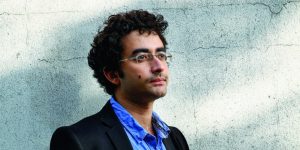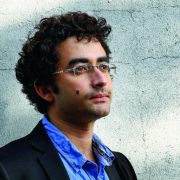Story of a poet telling his fight against the Al Assad regime
Being confined for nearly two months gave me loads of time to listen to podcasts and read more. Somewhat by coincidence my reading and listening started focusing on the ongoing Syrian civil war. This focus on Syria started with Omar Youssef Suleiman’s latest book Le Dernier Syrien, the Last Syrian. Omar Youssef Suleiman is a Syrian poet and journalist who has been living in France as a political refugee since 2012. More information on his biography and news can be found on his website, as well as here concerning his latest book Le Dernier Syrien, out in January 2020.
Today I would like to focus on his story, the story of a Syrian who switched from being an extremist Islamist Salafist to a pro-democracy activist fighting the regime of Bashar Al-Assad.

Picture available on Omar Youssef Suleiman’s website.
Omar Youssef Suleiman was born in 1987 near Damas in a deeply religious family. In interviews given at the end of 2015 on French radios France inter and France culture, he explained that religion governed every aspect of his life in Syria: his family would only talk about religion, and, at the beginning, he would only be reading religious texts or old Arabic literature. However, religion was important at a whole other level in Riyadh, Saudi Arabia, where he moved when he was 13. He explained that he was in Saudi Arabia when the 9/11 terror attacks happened, and there, he saw people cheering. He admitted that he cheered as well. At the time he considered Osama Ben Laden as a hero, saving the Arab world from the United States and Israel. For him, being an extremist Islamist Salafist seemed like a normal thing to be in Saudi Arabia.
Soon after going back to Syria however, he started questioning his faith and Salafist ideas. This process began when he moved to Homs to study literature. After having always lived with his grand-parents, uncles, and aunts and then his parents, Homs was the first place where Omar Youssef Suleiman was alone and free to do whatever he pleased. He therefore started going to the mosque, but also to church to ask questions and do research about religions. He began questioning Islam but also Christianism and any other religion. After his research he concluded that he did not need religion anymore and decided to become an atheist. Being an atheist was tough in Syria as it was associated to being a liar and a thief. But Omar Youssef Suleiman stuck to atheism.
Another “religion” Omar Youssef Suleiman grew up with was the cult of Hafez, and later Bashar, Al-Assad. In the same radio interview, the poet explained how the Al-Assad propaganda would start at an early age. Indeed, already when he was 7-8 years old, he was taught to scream, every morning, at school “Long life to the Bath party, long life to Hafez Al-Assad” or “Death to Israel, death to the Muslim Brotherhood”. He abandoned this religion as well. Indeed, in 2011, Omar Youssef Suleiman organised one of the first peaceful protest against the regime, in his university city of Homs. He said to have dropped classes, and exams, everything, to dive in fully into the protests. The poet remembers thinking that the fall of Zine Al Abidine Ben Ali, in Tunisia, was like a dream for the Arab world, a dream that he wanted coming true in Syria. When the regime ruthlessly responded to the peaceful protests, Omar Youssef Suleiman started contacting important newspapers, like the BBC, to inform them of the situation on the ground. He began filming protesters being brutalised and even killed and shared it on YouTube. Through those videos, the young poet was screaming for help, but the international community didn’t react.
In 2012, protesting became too dangerous for Omar Youssef Suleiman and he fled to neighboring Jordan. There he met with the French ambassador who arranged for his transfer to France where he was granted political asylum. His first year in Paris was hard as he did not speak any French, was a foreigner and was poor. Later, he said that, even if he was living in poverty, his moving to France had given him his life and dignity back and that was enough. Today, he is fluent in French and even wrote his last book, the Last Syrian, in French. When asked why he chose France, Omar Youssef Suleiman answered that he had always been interested by French culture since reading Paul Éluard and Louis Aragon. Furthermore, France was known as the human rights and freedom country, the opposite of Syria. Although he was far from the war, fear didn’t really leave, “we left the war, but the war never left us”.
During this whole time, Omar Youssef Suleiman had been writing. He first started when he was in Riyadh, where he had no friends and felt very lonely. During the summer, when school was over, he wouldn’t go out but would read and write at home. The poet then enrolled in a literature university programme in Homs. Today, although he also writes novels, Omar Youssef Suleiman mainly writes poem collections such as Far from Damas. His writings are politically active. His favorite poet, Paul Éluard, said “the poet is not only a poet – he is a man of freedom, a man of humanity”. It was therefore only logical for Omar Youssef Suleiman to write about freedom and humanity, but also about war, Syria, exile, and memory.
His poems are in Arabic, sometimes in French, but luckily for us Ghada Mourad translated some of his pieces in English, including his Do Not Tell Anyone poem.
Do Not Tell Anyone
I
Do you remember our childhood fighting game?
What’s happened is that we’ve entered the screen
And God has taken our place
II
Between the wide front lines
The sniper lens stops
A victim falls apart in my heart
III
The father who spreads his hand
Is covering the sun
So it won’t get burned by the face of a dead child
IV
As we cross the borders
Fleeing from live bullets
Do not tell anyone that we are alive
I thought that this poem was a good one to share as, according to me, it is a good summary of Omar Youssef Suleiman’s life: the questioning of God, the Syrian war and fleeing. Furthermore, raising awareness, through poetry, about the crimes committed by the Syrian regime always seems necessary, especially as two former members of the Syrian military are currently being trialed in Germany for war crimes and crimes against humanity

